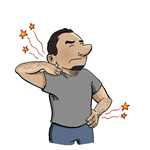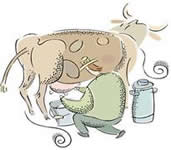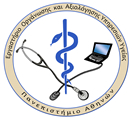Symptoms
|
 1. Fever that may be intermittent and does not subside 1. Fever that may be intermittent and does not subside
|
|
|
|
 2. Joint pain 2. Joint pain
|
|
|
|
 3. Sweating 3. Sweating
|
|
|
|
 4. Headache 4. Headache
|
|
|
|
 5. Weakness 5. Weakness
|
Transmission


Brucellosis is transmitted from animals to humans, mainly from domestic livestock (cattle, sheep, goats, pigs) and less from wild animals (boars, deers, wild rabbits) through
-
consumption of food, in particular unpasteurized dairy products from infected animals.
-
Unprotected contact with infected animals.
Treatment
For the treatment of the disease, seek medical care in order to be prescribed with the indicated medication.
Prevention
-
Consume only pasteurized milk. If you are not certain that milk is pasteurized, boil it for at least 2 minutes (it is not enough to see it start to boil) before drinking it.
-
Avoid consumption of fresh soft cheese if it has not been left to ripen for at least 2 months and of other daily products if you are not sure that good manufacturing practices have been observed.
-
Use plastic gloves when in close contact (e.g. assisting calving, milking) with animals that may be infected, as well as protective clothing, eye protection and a mask where animals are slaughtered.
-
If you come into contact with animals that may be infected without wearing any gloves, wash your hands thoroughly with water and soap and place povidone iodine on any open wounds or scratches.
-
If drops of contaminated material come into contact with your eyes, rinse them with plenty running water and see an ophthalmologist as soon as possible.
-
Wash at high temperatures or disinfect with household chlorine bleach or other disinfectant, clothing, shoes or any other items that may be contaminated through contact with infected animals.
-
Any manure slurry from infected animals should be processed as appropriate, and it should be removed in a safe manner.
When to seek medical advice
If you have symptoms that you suspect may be caused by brucellosis, seek medical advice.
References
keelpno
cdc
















